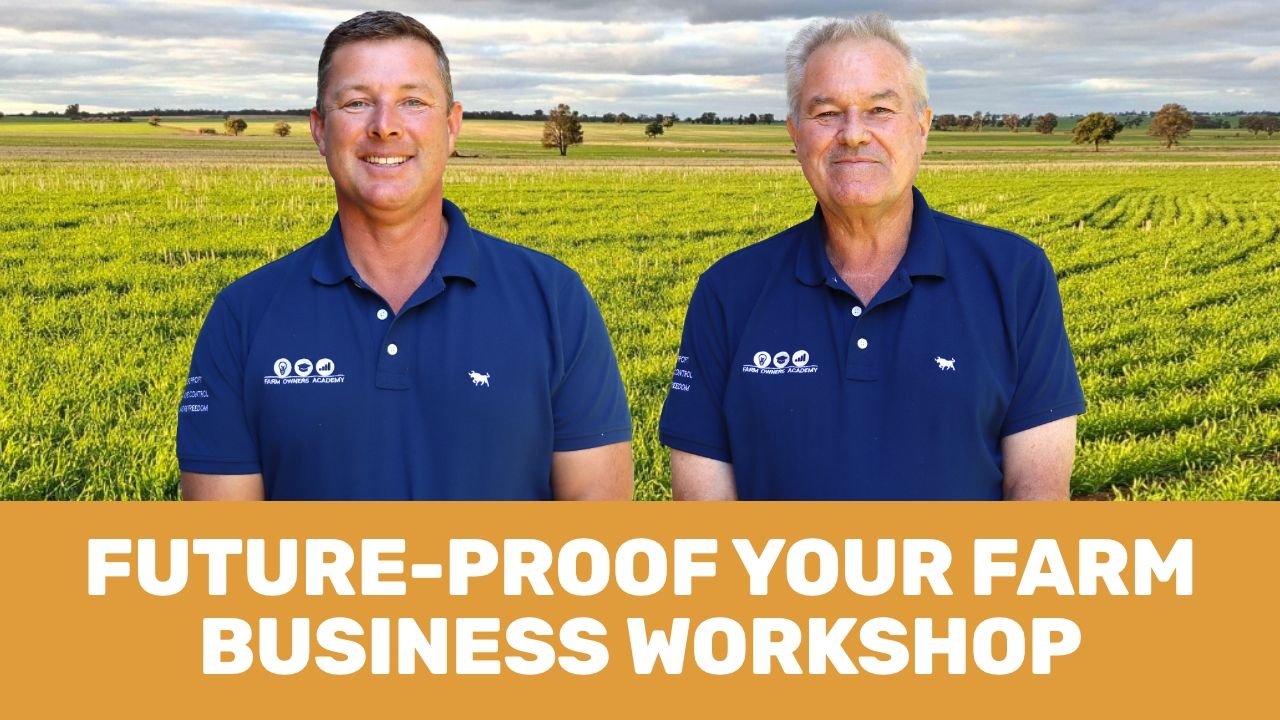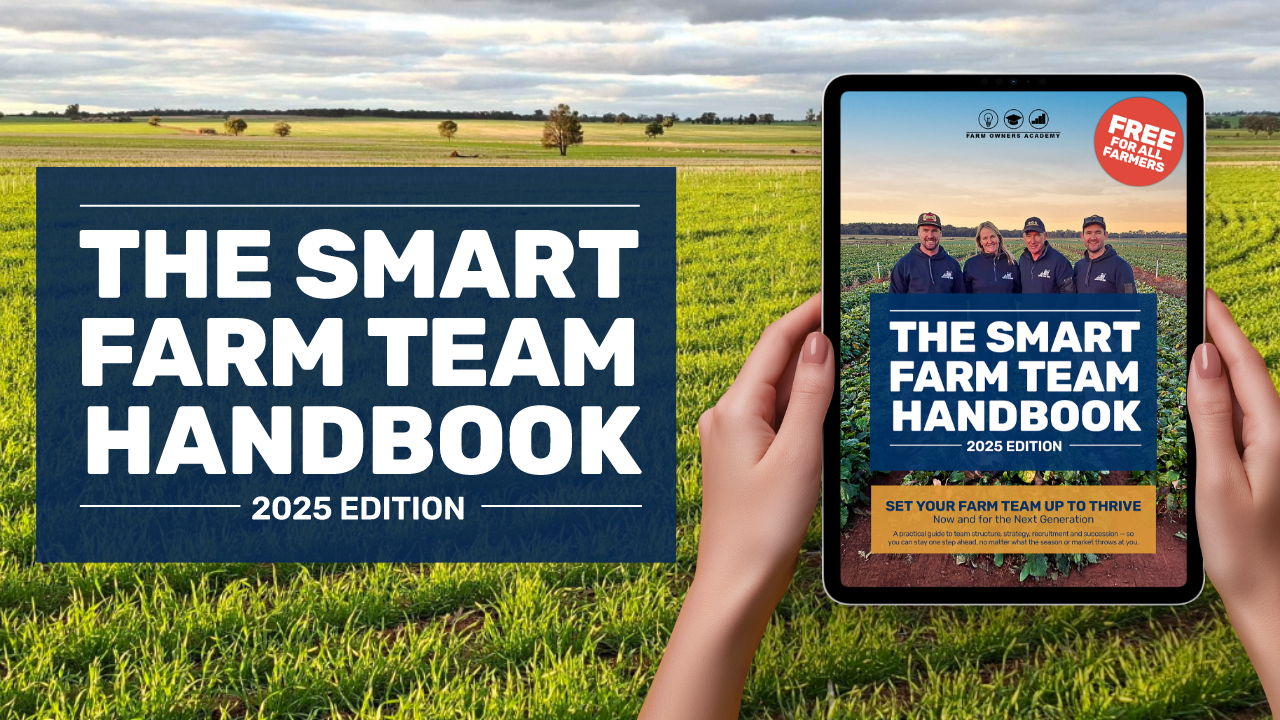The 5 Stages of Burnout...and How to Get Out of Each One
Jul 29, 2021
Quick check-in:
Are you tired?
Feeling unmotivated?
Getting angry and snapping at your partner, kids, or farmhand?
Suffering from headaches, stomachaches, or intestinal issues?
Generally not feeling a sense of purpose or accomplishment on the farm?
If you answered “yes” to one or more of these, you may be in burnout, my friend.
But don’t worry, you’re not alone. Many farmers come to Farm Owners Academy when they’re living in burnout, day in, day out.
Especially in the farming community, we value hard work. Maybe you were told that you needed to work 7 days a week, 12+ hours per day, so that’s what you’ve always done.
Maybe you think you have no choice if you want to be successful, that you simply have to work yourself to the bone to get ahead.
And maybe, the exhaustion and stress has become so normal that you don’t even know anything different.
That’s why it’s so important that we talk about burnout today. Because the truth is:
It’s not healthy to work this way
- It’s costing you productivity and results, and
- You can be successful without being constantly tired, stressed, and irritable (in fact, you’ll probably be much MORE successful when you get yourself out of burnout)
We consulted the big guns — Farm Owners Academy accountability coach Tracey Secombe, who works with our Platinum Mastermind members. And in today’s blog post, we’re sharing the symptoms of the 5 stages of burnout, to see if you’re in one of them.
And if you find that you are in burnout (most of us are!) we’ll share some steps you can take to reduce your stress levels and work from a much healthier place.
Our goal here at Farm Owners Academy is to help you create a Freedom Farm – that is to get better results in your farming business in less time and with less stress. (It’s completely possible — our Farm Owners Academy members have proven it.)
And it starts by taking care of the #1 asset on your farm: YOU. So let’s dive in…
The 5 Stages of Burnout
Stage 1: The Honeymoon Phase
You know when you start a new diet, exercise regime, or project and you feel excited for the challenge and committed to getting results? That’s the Honeymoon Phase.
This stage occurs before the real symptoms of burnout start.
Stage 1 is marked by high job satisfaction and commitment to the job at hand. You’ll also have high energy levels, good productivity, creativity, and optimism.
You may start to experience some light stress. But generally, you’re working from a high-energy, good-mood place.
The good news: Even if you’ve been running your farm 10, 20, or 30+ years, you can still get back into the Honeymoon Phase!
Doing things like developing a positive mindset, creating a strategic business plan, and growing a team to help you manage the farm will help you focus your energy on the tasks and projects you like best and produce great results. This can get and keep you in the healthy Honeymoon Phase.
Stage 2: Onset of Stress
As time goes on, some days feel more difficult than others.
Some days are still exciting but others aren’t.
You may start to lose enthusiasm and momentum as tasks and projects don’t go as smoothly as you expect.
And you may find your optimism waning and notice stress affecting you physically, mentally, or emotionally.
That’s when you’ve moved from the Honeymoon Phase to Stage 2: the Onset of Stress.
The symptoms of Stage 2 of burnout appear at three levels:
- Physical symptoms: fatigue, grinding your teeth at night, headaches, high blood pressure, lack of quality sleep, unusual heart rhythms or palpitations
- Emotional symptoms: anxiety, forgetfulness, inability to focus, irritability, job dissatisfaction
- Behavioural symptoms: avoidance of decision-making, change in appetite/diet, general neglect of personal needs (eating well, exercising, taking care of yourself), lack of social interaction, lower productivity
Those symptoms sound pretty common, right? Most of us have been in Stage 2 at some point.
Sometimes, work is just a bit more stressful than usual — it happens to all of us.
Stage 2 can still be a healthy place if you use coping strategies to manage the stress without letting it overcome you. (Keep reading for specific stress management suggestions below).
Stage 3: Chronic Stress
If you’ve been putting up with Stage 2 for a while, it often progresses to Stage 3: Chronic Stress.
You’ll notice a marked change in stress levels and may experience more intense symptoms than Stage 2.
Stage 3 symptoms include everything in Stage 2, PLUS:
- Physical symptoms: deep exhaustion, persistent tiredness (more than just low energy), physical illness, odd ailments
- Emotional symptoms: anger, aggressive behavior, apathy (“I don’t even care”), cynical attitude, resentfulness, feeling threatened, panicked, or out of control
- Behavioural symptoms: decreased sexual desire, denial of problems at work or home, increased alcohol/drug use, increased caffeine consumption, lack of hobbies, missed work deadlines/targets, procrastination, social withdrawal, uptake of escapist activities (watching TV, scrolling social media, anything to “switch off” and avoid reality).
Many of us have been in Stage 3 before. So if you feel like that’s you, there are things you can do to turn it around.
It’s important to implement some coping strategies here to support your wellbeing and prevent you from moving into a further stage of burnout. Here are some key things to keep in mind:
Cut yourself some slack. Accept that you’re feeling overwhelmed, and that’s okay. Almost all farmers and business owners have felt this way. All you can do is your best, so try to have realistic expectations…and not feel pressured to achieve superhuman results overnight.
Take care of yourself. You know the drill! Drink enough water. Eat quality foods. Get enough sleep. Exercise. Spend time doing things you love, with people you love. Take deep breaths and engage in a mindfulness practice like meditation. These things are often overlooked but can make the biggest difference!
Focus on the lessons, not the losses. You’re always growing and changing as a business owner. There’s no such thing as failure, remember. Every so-called “loss” is a lesson that will help you do better next time. Embracing “failure” as a natural part of the road to success can help you feel less stressed when things don’t go perfectly.
Do what you can to reduce your stress levels. Maybe it’s hiring a farmhand. Re-organising your business to take some things off your plate. Working with a coach. (Farm Owners Academy can help!) Ideally, you want to move back down to Stage 2, where you feel some stress but it doesn’t overwhelm you. Think of what will help YOU (because everyone’s different) take your stress levels down a notch or two so they feel more manageable.
Stage 4: Burnout
This is when you cross the threshold from stress into burnout itself.
Burnout is the result of chronic, long-term stress. And it’s much more than feeling overwhelmed.
It’s a constant state of exhaustion and it becomes increasingly difficult to cope. Continuing as normal is often not possible and many people have some sort of breakdown when they’re in burnout.
Here are the symptoms of Burnout:
- Physical symptoms: chronic headaches, chronic stomach or bowel problems, physical symptoms/illnesses that have intensified or increased
- Emotional symptoms: desire to “drop out” of society, desire to move away from work or family/friends, feeling empty inside, pessimistic outlook on work and life, extreme self-doubt
- Behavioural symptoms: complete neglect of personal needs, increase in escapist activities, obsession over problems at work or in life, social isolation, working all the time and have no balance in your life
Steps to Recover from Burnout Without Progressing to Stage 5
If you recognise that you’re in Stage 4, it’s important to take steps to recover NOW.
You must make it a priority to reduce your stress and feel better; it’ll only get harder the more you progress.
There will ALWAYS be more to do on the farm. And there will never be someone forcing you to prioritise yourself and fix your burnout situation — only you can do that.
Luckily, there are simple things you can start TODAY to prioritise your well-being. Here’s a list of the best things you can do now to treat your burnout before it gets worse:
DO LESS: Prioritise your to-do list
A lot of the time, the reason we’re burning out is we’re saying “yes” to too many things, rather than being really clear about what our priorities are. We call this “hitting the ceiling” because you’ve reached capacity and need to do less to recover.
This is the beauty of making a quarterly plan because it tells you what’s most important to focus on. A quarterly plan makes it easy to say “no” or “later” to anything that doesn’t support your goals for the quarter.
It’s also helpful to create a STOP-doing list. This is often more powerful than a to-do list!
To create your stop-doing list, look at your schedule and audit the activities on your weekly list, by asking yourself:
- Why am I doing this task?
- Will it really benefit me to do this? (Does it really need to be done?)
- Am I the person who should be doing this? (For example, maybe your kids can make lunches or a farmhand can drive the tractor).
- Can I do this later?
You’re bound to find tasks that you don’t really need to do right now. Add these to your stop-doing list! Freeing up space in your schedule is step 1 to feel less burnt out.
RELATED POST: The 5 Ways to Break Through the Ceiling
Sleep!
This sounds so simple but is absolutely vital to recover from burnout! Prioritise your sleep.
That means going to bed at a good time, especially if you wake up really early. If you struggle to unwind at night, try some deep breathing exercises or meditation before bed. (See next section.)
Pay attention to your own rhythms. Different people have different sleep needs. Just because your wife or your dad only need 5 hours to function well doesn’t mean you do! Start by aiming for 8 hours of sleep each night and notice how you feel. Adjust from there to find your ideal amount.
Calm your mind
I know meditation and deep breathing exercises might feel fluffy to you. But don’t knock it until you try it! They’re powerful, proven strategies to overcome burnout.
You can reset your stress levels by pausing and breathing intentionally, even just for a minute. By taking slow, rhythmic breaths, you “speak” to your brain and tell it you’re okay. It’s scientifically proven to de-stress your body. (Harvard Medical School even agrees!)
Here’s a simple breathing exercise:
Breathe in for a count of 4, then breathe out for a count of 8.
Easy, right? Anyone can do it. The next time you’re feeling stressed, try it for a minute or so…you’ll be amazed how just a few deep breaths can instantly calm you down and make you feel less stressed.
Meditation is also a great strategy to quiet your thoughts. Feeling exhausted is linked to being disconnected. When we’re aligned, tuned in, and relaxed, we feel good and in control of our lives.
There are millions of free meditations on the internet. You can try a free trial of the Headspace app or watch a video on The Mindful Movement Youtube channel.
Here’s a great meditation to start with:
Exercise
You can release so much stress and anxiety through moving your body. So don’t overlook the importance of exercise not just for your physical health, but for your mental and emotional health as well.
We often think high intensity is the best way to release stress, but it can actually increase your stress levels. So aim for moderate activities instead. Walking at a brisk pace is a great exercise that will naturally release stress.
Try a variety of exercise: walking, playing sport, swimming, yoga, stretching, weight training — and see which one(s) helps you feel your best.
Eat (and drink) well
Poor hydration is linked to exhaustion. So make sure you’re drinking plenty of water throughout the day. For women living in a temperate climate you need about 2.7L per day, and for men about 3.7L per day. Approximately 20% of this comes from what you eat, the rest needs to come from fluids. If you are doing exercise or physical work the requirements increase.
Give it a try for a week — bet you’ll notice a positive change in your energy levels and mood when you’re fully hydrated.
When it comes to food, start by eating when you’re hungry. You’re better off following your own hunger cues than sticking to a regimented breakfast-lunch-dinner schedule. Your needs may differ depending on the day.
You know how to eat healthy, right? We don’t need to go into the details. Add more whole foods, vegetables, and fruits to your plate and take away some sugar and processed stuff. High sugar causes a blood sugar spike and drop, which leaves you feeling exhausted.
Accountability coach Tracy specifically suggests that adding more alkaline foods into your diet helps with burnout. (You can Google this to find out what they are). Alkaline foods are excellent for nourishing the body and helping to reduce stress.
It’s also great to have some go-to healthy snacks ready when hunger strikes so you don’t grab something that will make you feel crap an hour later. A few examples:
- apple and peanut butter
- cucumber with cream cheese
- crackers and hummus
- a handful of nuts
These snacks will keep you fueled without the energy crash of sugary sweets.
Spend time with hobbies / passions
The farming community is so work-focused. But life’s too short not to do things just for you, too.
That’s why spending some time doing things you love is a great treatment for burnout.
Even 5 minutes a day of something you enjoy can make a difference. That could be:
- Building model trains
- Listening to music
- Playing sport
- Riding bikes with your kids
- Lighting a bon fire and spending time with friends or family
Make time for activities you enjoy, even if it’s only a short amount of time. Tapping into this sense of passion will increase your energy and mood, and make you more resilient to handle the stress of work.
Stage 5: Habitual Burnout
If you don’t address the symptoms of burnout at Stage 4, it can progress to Stage 5.
This is when burnout becomes so normal in your life that you experience significant ongoing mental, physical or emotional problems.
Stage 5 happens in farming all too often because our community has such a strong work ethic. It often crosses over into unhealthy territory and pushes farm owners to the brink.
Habitual Burnout is when burnout has become very severe, and includes additional symptoms of:
- Burnout syndrome
- Chronic mental fatigue
- Chronic physical fatigue
- Chronic sadness
- Depression
It’s critical you reach out for professional help if you’re in Stage 5. You can’t do it on your own.
Let’s say that again: You can’t do it on your own.
Talking to your doctor is a great first step. Psychologists or counselors are other professionals you can reach out to help.
(And you can always email us at support@farmownersacademy.com. We’re not mental health professionals but we can connect you with resources to help.)
In an industry as challenging and difficult as farming, burnout is a common problem.
If you find yourself in burnout, don’t beat yourself up. So many of us have been there!
But equally, don’t downplay it or let it slide. It’s really important you take steps to address your stress levels NOW (not tomorrow or next week or next year) or it can quickly spiral out of control.
If you’re feeling stressed, try one of these things today to get started (then add another one tomorrow):
- Do less — create a stop-doing list and cut out any tasks you don’t need to do today
- Get 8 hours of sleep
- Deep breathing: breathe in for 4 counts, out for 8 counts, repeat for 2-3 minutes
- Meditate
- Go for a brisk walk
- Drink enough water
- Eat more alkaline foods…and less sugar and processed foods
- Spend time doing activities you love outside of work
- Seek professional help
As always, if you need to talk, we’re here for you. Just reach out at support@farmownersacademy.com.








